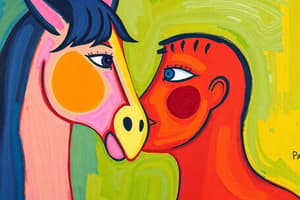Podcast
Questions and Answers
What does learning refer to?
What does learning refer to?
- A relatively enduring change in observable behavior that occurs as a result of experience (correct)
- A temporary change in behavior
- An involuntary response
- A change that occurs without experience
What is classical conditioning?
What is classical conditioning?
A type of learning that occurs when individuals learn to produce involuntary emotional or physiological responses.
What is an unconditioned stimulus?
What is an unconditioned stimulus?
An object or event that causes an instinctive or reflexive physiological or emotional response.
What is an unconditioned response?
What is an unconditioned response?
What is a neutral stimulus?
What is a neutral stimulus?
What is a conditioned stimulus?
What is a conditioned stimulus?
What is a conditioned response?
What is a conditioned response?
What is generalization in classical conditioning?
What is generalization in classical conditioning?
What is extinction in classical conditioning?
What is extinction in classical conditioning?
What is operant conditioning?
What is operant conditioning?
What is a consequence in operant conditioning?
What is a consequence in operant conditioning?
What is a reinforcer?
What is a reinforcer?
What is reinforcement?
What is reinforcement?
What is positive reinforcement?
What is positive reinforcement?
What is negative reinforcement?
What is negative reinforcement?
What are punishers?
What are punishers?
What is punishment?
What is punishment?
What is presentation punishment?
What is presentation punishment?
What is removal punishment?
What is removal punishment?
What is cognitive learning?
What is cognitive learning?
What is modeling?
What is modeling?
What is cognitive modeling?
What is cognitive modeling?
What is vicarious learning?
What is vicarious learning?
What is inhibition?
What is inhibition?
What is self-regulation?
What is self-regulation?
What is cognitive behavior modification?
What is cognitive behavior modification?
Who is John Watson?
Who is John Watson?
What contributions did John Watson make?
What contributions did John Watson make?
Flashcards are hidden until you start studying
Study Notes
Learning Concepts
- Learning involves a lasting change in observable behavior due to experience.
- Classical conditioning results in involuntary responses akin to instinctive reactions.
Classical Conditioning Elements
- Unconditioned stimulus: An object/event eliciting an unlearned emotional/physiological response.
- Unconditioned response: The reflexive reaction to an unconditioned stimulus.
- Neutral stimulus: An object/event that does not initially affect behavior.
- Conditioned stimulus: A neutral stimulus that becomes linked to an unconditioned stimulus.
- Conditioned response: A learned response similar to the unconditioned response.
- Generalization: Similar stimuli trigger the conditioned response on their own.
- Extinction: Conditioned response fades when conditioned stimulus is presented without unconditioned stimulus.
Operant Conditioning
- Operant conditioning modifies the frequency or duration of observable behavior through consequences.
- Consequences influence the likelihood of behavior recurrence.
Reinforcement Principles
- Reinforcer: A consequence that boosts the chances of a behavior happening again.
- Reinforcement: The process of applying reinforcers to encourage behavior.
- Positive reinforcement: Frequency/duration of behavior increases through the addition of a reinforcer.
- Negative reinforcement: Behavior increases by avoiding/removing an unpleasant stimulus.
Punishment Concepts
- Punishers: Consequences that reduce likelihood of behavior recurrence.
- Punishment: Using punishers to diminish behaviors.
- Presentation punishment: Behavior decreases when a punishing stimulus is added.
- Removal punishment: Behavior decreases when a stimulus is taken away or positive reinforcement is inaccessible.
Cognitive Learning
- Cognitive learning: A change in mental processes that enables different behaviors.
- Modeling: Changes in behavior, cognition, and emotions through observing models.
- Cognitive modeling: Demonstrating actions while explaining the thought process behind them.
- Vicarious learning: Adjusting behavior based on consequences observed from others' actions.
Behavioral Regulation
- Inhibition: Self-restriction of behavior.
- Self-regulation: Setting personal goals combined with motivation, thoughts, strategies, and behaviors to achieve them.
- Cognitive behavior modification: Merging behavioral and cognitive principles for self-instruction and self-talk to facilitate behavioral change.
John Watson's Contributions
- John Watson (1878-1958): Known for generalization-inductive reasoning and focusing on observable behaviors in psychology.
- Founded behaviorism as an approach prioritizing observable behavior over subjective mental states.
- Influenced by Pavlov's work on observable behaviors, applying it within psychology.
- Emphasized the importance of environment and conditioning in shaping behavior, as illustrated in the "Little Albert" study.
- Advocated for the potential to shape individuals using early conditioning techniques.
Studying That Suits You
Use AI to generate personalized quizzes and flashcards to suit your learning preferences.




